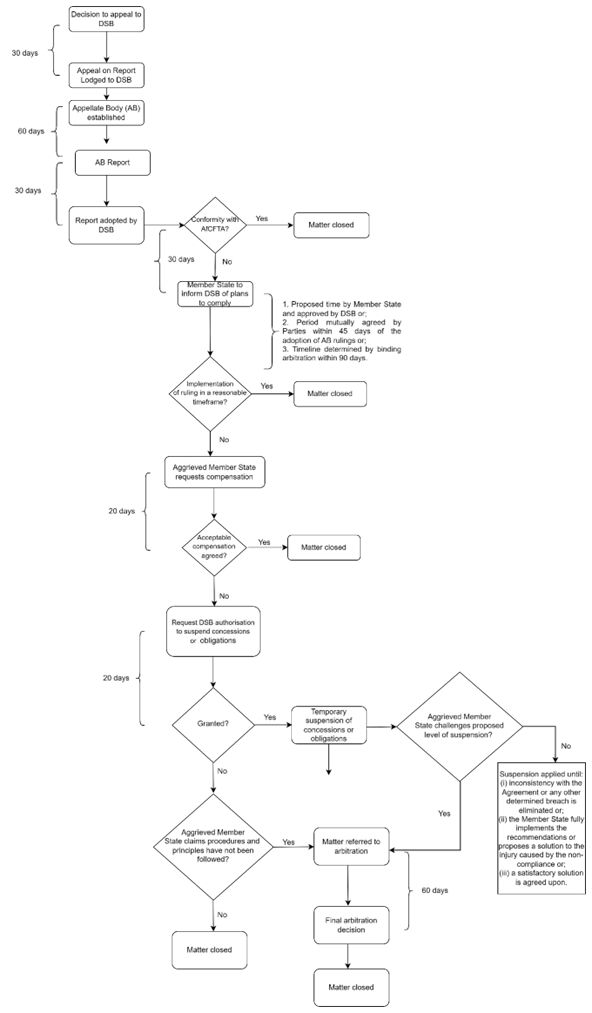- within International Law topic(s)
- in Africa
- with readers working within the Banking & Credit industries
This article is the fourth, and last, of a series analysing the African Continental Free Trade Area (AfCFTA) and its implications for the Mauritian business community. This fourth article explores the Protocol on Rules and Procedures on the Settlement of Disputes, focusing on the appeals process through the Appellate Body as well as arbitration.
The AfCFTA is a landmark trade agreement, constituting the largest free trade area in the world in terms of the number of participating countries (See AfCFTA Part 1)1. The Agreement, which brings together 54 African countries and eight regional economic blocs, represents a combined population of 1.3 billion and total GDP estimated at USD 3.4 trillion. The AfCFTA aims to eliminate tariffs and non-tariff barriers on almost all trade in goods and services. A dispute settlement mechanism is essential for ensuring that any conflicts which arise in the implementation of the AfCFTA can be transparently and predictably settled.
Disputes arise frequently in international trade, and disagreements on the application of the rules by one party is often referred to a dispute settlement body, such as the one held at the World Trade Organisation, to resolve the dispute in an independent manner. Disagreements may take many shapes or forms. For example, they can include disputes regarding the alignment of tariffs to the schedule of a party, artitrary technical standards being applied by a party that are considered as being discriminatory in nature, unfair subisidies given to an industry which exports, or predatory pricing policies applied by exporters among others.
The previous article explains the various steps involved in dispute settlement before the appeal process is considered (see AfCFTA Part 32). These steps, explained in the article, are illustrated in the Figure below.

Once a Member State communicates its decision to appeal to the Dispute Settlement Body (DSB), an appeal on the report of the Panel should be lodged with the DSB within 30 days. The DSB will then establish a standing Appellate Body (AB) comprising seven people, three of whom will serve on any one case. Persons appointed on the AB must have recognized authority and demonstrated expertise in law, international trade, and the subject matter of the AfCFTA and must not be affiliated with any government. Appointees to the AB serve in rotation as determined in the working procedures of the AB and are appointed for a four-year term, renewable once. The AB, in consultation with the Chairperson of the Dispute Settlement Body (DSB), is responsible for drawing up working procedures which should be communicated to the State Parties for their information. The AB should also be provided with appropriate administrative and legal support as required to carry out its functions effectively.
Only parties directly involved in the dispute may appeal a Panel report. Third parties with substantial interest in the matter may also make written submissions to, and be given the opportunity to be heard by, the AB. It should be noted that the scope of an appeal is limited to issues of law covered in the Panel report and legal interpretations developed by the Panel. In general, proceedings for an appeal should not exceed 60 days from the date a party formally notifies its decision to appeal until the AB circulates its report. In case the AB cannot provide the report within 60 days, it must inform the DSB in writing of the reasons for the delay and provide an estimate of the period within which it will submit its report. Proceedings cannot exceed 90 days.
The AB has the authority to maintain, change, or reverse the legal findings and conclusions of the Panel. AB proceedings are confidential and reports of the AB should be drafted without the presence of the parties to the dispute. Opinions expressed in the AB report by individuals serving on the AB should also be anonymous. A single report, reflecting the views of the majority of the AB members, should be produced at the end of the proceedings. This report should be adopted by the DSB and unconditionally accepted by the Parties to the dispute, unless the DSB decides, by consensus, not to adopt the AB report within 30 days following its circulation to the Member States. This adoption procedure does not prejudice the right of Member States to express their opinion on the report.
Following the dispute settlement process, if a Panel or the AB concludes that a measure taken by a Member State is not in conformity with the AfCFTA, this conclusion will be made explicit and recommendations will be provided to the relevant Member State to ensure that the measure is consistent with the Agreement. Additionally, the Panel or the AB may propose ways in which these recommendations can be implemented.
Member States are obligated to rapidly comply with recommendations and rulings of the DSB and should inform the DSB of their plans to implement the same at a meeting which should be held within 30 days of the adoption of the final report by a Panel or the AB. In cases where it is not possible for a Member State to promptly implement the recommendations and rulings of the DSB, the Member State should be given reasonable time to comply taking into account the following:
- the proposed period of time by the Member State is approved by the DSB; or
- in cases where such approval is absent, a period mutually agreed by Parties to the dispute within the timeline of 45 days of the date of adoption of the report of the Panel and the AB and recommendations and rulings fo the DSB;
- in the absence of an agreement by the Parties to the dispute, a timeline may be determined through binding arbitration within 90 days. In such a case, a guideline for the arbitrator should be that the reasonable period should not generally exceed 15 months from the date of adoption of the report.
In cases where the parties cannot agree on an arbitrator within 10 days after bringing the matter to arbitration, the arbitrator will be appointed by the Secretariat in consultation with the DSB within 10 days after consulting the Parties to the dispute. The maximum timeframe between the date of establishment of the Panel by the DSB to the date of determination of the reasonable period is 15 months unless the Parties to the dispute agree otherwise. If the Panel or the AB took additional time to provide its report, the 15 months period can be extended by the additional time taken. The total time should however not exceed 18 months unless agreed by the Parties to the dispute.
The DSB is responsible for monitoring the implementation of adopted recommendations or rulings. Any Member State can raise issues regarding implementation at the DSB. Issues regarding implementation will be placed on the agenda of the DSB meeting six months after the establishment of the reasonable period of time and will remain on the agenda until the issue is resolved. The Member State concerned with implementation should provide the DSB with a detailed status report including the extent of the implementation of the rulings and recommendations, any issues affecting implementation and the time required by the Member State for full compliance.
If the recommendations and rulings of the DSB are not implemented in a reasonable period of time, the aggrieved Member State may resort to temporary measures including compensation and the suspension of concessions or other obligations. Compensation is voluntary and should be consistent with the Agreement if applied. The aggrieved Member State should request authorisation from the DSB to suspend the concessions and other benefits of the Agreement to the Member State concerned if no acceptable compensation is agreed upon within 20 days. The DSB needs to grant authorisation to suspend concessions or other obligations within 30 days from the date of the request unless there is consensus in the DSB to reject the request.
The suspension of concessions or other obligations is temporary and can only be applied until:
- the inconsistency with the Agreement or any other determined breach is eliminated or;
- the Member State fully implements the recommendations or proposes a solution to the injury caused by the non-compliance or;
- a satisfactory solution is agreed upon.
Additionally, the following considerations apply when the aggrieved Member State considers which concessions or obligations should be suspended:
- The general principle is that the aggrieved Member State should first pursue the suspension of concessions or obligations related to the same sector(s) as that in which the Panel or AB has found a violation or other nullification or impairment;
- In cases where the aggrieved Member State considers it is unfeasible to suspend concessions or other obligations in the same sector(s), it may seek to suspend these in other sectors under the Agreement;
- If the aggrieved Member State deems that it is impracticable to suspend concessions or other obligations in other sectors under the Agreement, and the circumstances are serious enough, it can request to suspend concessions or other obligaions under the Agreement;
- To request the suspension of concessions or other obligations under (ii) and (iii) above, the aggrieved Member State must state the reasons for its decision in its request to the DSB.
In applying the above principles, the aggrieved Member State should take into account the trade in the sector under which the Panel or AB has found a violation and the importance of such trade to the aggrieved Member State as well as the broader economic implications related to the suspension. If the concerned Member State challenges the proposed level of suspension or asserts that the principles and procedures have not been followed, the matter will be referred to arbitration which will be executed by the original Panel if the Panellists are available or by an arbitrator selected by the DSB. Concessions or other obligations are not suspended during arbitration which should be completed in a maximum timeframe of 60 days within the date of appointment of the arbitrator.
The arbitrator's role is to determine the equivalence of the suspension level to the nullification or impairment and he or she may also make determinations on the proposed suspension of concessions or other obligations, specifically assessing whether it is allowed under the terms of the Agreement. Member States involved in the dispute should accept the arbitrator's decision as final and should not resort to a second arbitration. The DSB needs to be informed of the arbitrator's decision and may, upon request, provide authorisation to suspend concessions or other obligations if the request is in line with the final decision of the arbitration, unless the DSB decides by consensus not to approve the request.
Remuneration of Panellists, arbitrators and experts is determined by the DSB in accordance with the financial rules and regulations of the African Union. The costs associated with Panellists, arbitrators, and experts, including their remuneration, travel, and lodging expenses, must be shared equally by the parties involved in the dispute or in the proportions determined by the DSB. Parties involved in the dispute are required to deposit their share of the Panellists' expenses with the Secretariat at the time of the establishment or composition of the Panel. All other costs of the dispute settlement process have to be borne by the relevant Party to the dispute as determined by the DSB.
The appeal process is a crucial component of an efficient dispute settlement mechanism and provides the Mauritian private sector with a fair and impartial channel to protect its interests in the AfCFTA market. It is therefore important for Mauritian businesses to be well-informed on the process, as they will be key to initiating government-led dispute resolution efforts to contribute to a fair and effective trading environment within the AfCFTA.
International Economics Consulting Ltd (IEC) is an independent consultancy firm working with national and international development partners, governments, and the private sector to create value and promote sustainable growth and development. With extensive experience in trade policy, research, and negotiations, IEC can support governments and businesses deal with unfair trade practices and unforeseen consequences of free trade by providing analytical expertise and support.

References
AfCFTA Treaty – Consolidated Text, African Union Website, Available at: https://au.int/sites/default/files/treaties/36437-treaty-consolidated_text_on_cfta_-_en.pdf
Footnotes
1. Baker, P.; Quiles, P. & Bheenick, S. (2023). Mauritius and the AfCFTA Part 1: Trade in Goods. Mondaq. Available from: https://www.mondaq.com/international-trade--investment/1350384/mauritius-and-the-afcfta-part-1-trade-in-goods
2. Baker, P.; Quiles, P. & Bheenick, S. (2023). Mauritius and the AfCFTA Part 3: Dispute Settlement. Mondaq. Available from: https://www.mondaq.com/international-trade--investment/1373790/mauritius-and-the-afcfta-part-3-dispute-settlement#:~:text=The%20Dispute%20Settlement%20Protocol%20applies,Dispute%20Settlement%20Body%20(DSB)
The content of this article is intended to provide a general guide to the subject matter. Specialist advice should be sought about your specific circumstances.


